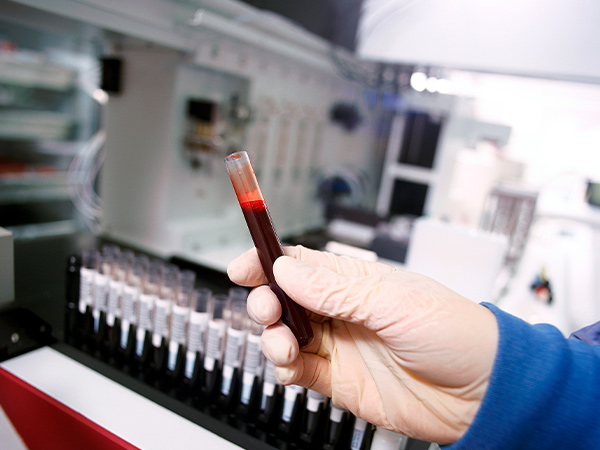Liquid Biopsy Approved for Lung Cancer
The FDA-approved diagnostic test uses blood samples to look for specific mutations in certain patients with metastatic lung cancer.

The U.S. Food and Drug Administration (FDA) recently approved a liquid biopsy – a test that uses a blood sample – to identify patients with metastatic non-small cell lung cancer (NSCLC) who would be eligible for treatment with erlotinib (Tarceva).
The diagnostic test called cobas EGFR Mutation Test v2 detects specific alterations in the gene epidermal growth factor receptor (EGFR). These mutations are present in about 10 to 20 percent of NSCLCs, the most common form of lung cancer.
Unlike a traditional biopsy—an invasive procedure to collect a piece of the tumor tissue that requires local anesthesia, causes discomfort to the patient, and may not always be feasible because of the location of the tumor or several other reasons—a liquid biopsy is essentially a blood draw. The samples are spun down to collect plasma and isolate DNA shed by the tumor into blood circulation, so-called circulating-free tumor DNA (CfDNA).
Advanced technologies have now made it possible to analyze small amounts of cfDNA for mutations pertaining to a specific disease. In the case of this newly approved test, the cfDNA is analyzed for the presence of the specific mutations in the EGFR gene, which make the patients eligible for treatment with the FDA-approved drug erlotinib.
The ease with which liquid biopsies can be obtained makes them also useful in real-time monitoring of disease progression because, in many cases, tumors evolve and may need different treatments based on the genetic changes that occur within the tumor.
In an interview to forecast cancer research and treatment advances in 2016, David Solit, MD, a precision medicine expert at Memorial Sloan Kettering Cancer Center, said: “The use of circulating-free DNA collected from blood [liquid biopsy] to determine which treatment a cancer patient should receive is already a reality, and will begin to change the way we diagnose and treat patients in 2016. In 2016 and 2017, we will likely see liquid biopsies becoming a standard of care for some cancer types.”
This recent FDA approval shows, as Solit predicted, we are truly moving toward making cancer diagnosis and treatment monitoring a more efficient and convenient endeavor to cancer patients in the near future.
The FDA approval was rendered on June 2, 2016.